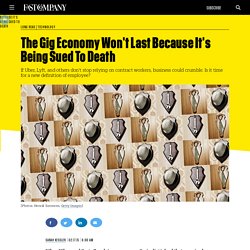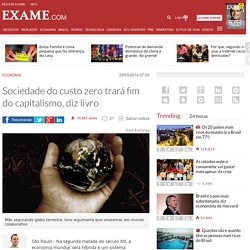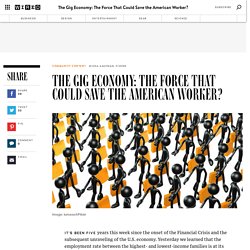

The Gig Economy Won't Last Because It's Being Sued To Death. When Vilma and Greta Zenelaj came across a Craigslist job ad that promised they could make as much as $22 an hour and get paid fast, it seemed like a good deal.

The Albanian sisters had moved to Santa Monica to get a foothold in the film industry, and though they had produced a few independent features, they had run out of savings before they could also make a living. Now they were desperate to pay their bills. Handy (then Handybook), the company that posted the Craigslist ad, is best known as a cleaning service. But unlike Merry Maids or your local cleaning franchise, it doesn’t actually employ any cleaners. Instead, it relies on an army of independent contractors to complete jobs, taking a 15% to 20% commission of every hour worked.
But the Zenelajs had never heard of the gig economy, and it wasn’t until orientation that they realized they would not be employees of Handy. Soon they were booking up to four cleanings a day through the platform. Other answers allow for more change. What Airbnb Gets About Culture that Uber Doesn’t - HBR. Last week, as Uber battled a media firestorm after a senior executive talked of investigating unfriendly journalists and a company manager actually used its “God View” feature to track the comings and goings of a reporter, Airbnb welcomed more than 1,500 of its most productive providers to its first-ever host convention, an immersive celebration one expert attendee likened to a Mary Kay event.

The happy #AirbnbOpen sentiment of gift-wrapped programs, food drives, and a new company logo that doubles as a swing filled my Twitter stream, painting a stark contrast to the cynicism of the dystopian #ubergate tweets. The contrast was especially striking given that Airbnb and Uber are together inventing a new organizational form: platforms that are firm-market hybrids, supplying branded service offerings without actually employing the providers or owning the assets used in provision. These two flagship platforms of the sharing economy are remarkably similar in many ways. Sociedade do custo zero trará fim do capitalismo, diz livro. São Paulo - Na segunda metade do século XXI, a economia mundial será híbrida e um sistema colaborativo estará convivendo com um capitalismo cada vez menos importante.

A previsão provocativa é do americano Jeremy Rifkin, que acaba de publicar seu novo livro "The Zero Marginal Cost Society" ("A Sociedade do Custo Marginal Zero", em tradução livre). Depois de uma série de bestsellers sobre os impactos da tecnologia na economia, ele foi além e vislumbrou um futuro no qual a lógica colaborativa da internet tomou conta de quase todo o sistema. Em outras palavras: depois de séculos nos quais o capitalismo conseguiu levar várias dimensões da vida humana para a esfera econômica, o processo começou a se reverter. Tese. Silicon Valley's gig economy is not the future of work – it's driving down wages.
Like many of the other tech companies – Lyft, Zaarly, Fiverr – that have gotten bucketloads of venture capital to match underemployed people with no-commitment gigs, TaskRabbit taps into an existing need – any kind of income in an economy increasingly built on low-wage jobs or no jobs at all – and fulfils a real desire for flexibility among 21st-century workers.
The company's CEO has said that TaskRabbit's goal is to "revolutionize the world's labor force". But TaskRabbit, like all the others, is just a site and an app that matches workers – "taskers", in the company's terminology – with one-off jobs that other people want done for them. In the old days – as in, a couple of weeks ago – workers would bid on jobs posted by potential clients on the TaskRabbit site, and clients would select the best bid for "outsourcing" chores like cleaning the oven, wrapping gifts or assembling Ikea furniture. Now, TaskRabbit has changed its rules. The taskers are not pleased. 'Economia do bico' preocupa EUA. Quando o Escritório do Comissário do Trabalho da Califórnia decidiu, no mês passado, que um motorista do Uber era um empregado que devia ter uma série de proteções no lugar de trabalho - e não, como a companhia sustentava, um fornecedor autônomo -, ele ressaltou os sentimentos ambíguos de muitos americanos sobre o que está sendo chamado, cada vez mais, de "economia do bico".

The Gig Economy: The Force That Could Save the American Worker? It’s been five years this week since the onset of the Financial Crisis and the subsequent unraveling of the U.S. economy.

Yesterday we learned that the employment rate between the highest- and lowest-income families is at its widest since officials began tracking data a decade ago, reports the The Associated Press. The figures are startling: the unemployment rate for those earning less than $20,000 is now 21 percent, nearly matching the rate for all workers during the 1930s Great Depression. Amid these sobering headlines, you can’t blame American workers for despairing over their professional lives. Yet there are glimmers of hope. Slowly but surely, a revolution is taking shape –– an entirely different kind of economy.
It could be the force that saves the American worker. This revolution is certainly the result of economic forces over the last decade, particularly in the wake of the Financial Crisis and Great Recession. When I started my career, things were already different.